HARA-KIRI: DEATH OF A SAMURAI (ICHIMEI) (Takashi Miike, 2011)
IFC Center
323 Sixth Ave. at Third St.
Through August 16, $17.50, 1:25 & 9:35
212-924-7771
www.ifccenter.com
www.tribecafilm.com
 Nearly fifty years after Masaki Kobayashi’s Harakiri won the Special Jury Award at the 1963 Cannes Film Festival, Takashi Miike’s magnificent 2011 remake was also entered into competition at the prestigious French event. During peaceful times in 1634 Edo, a masterless samurai named Hanshiro Tsukumo (Kabuki star Ebizo Ichikawa) comes to the Lyi clan, requesting permission to commit seppuku in the estate’s courtyard, seeking an honorable death. But clan retainer Kageyu Saito (Kōji Yakusho) and his right-hand man, Hikokuro Omodaka (Munetaka Aoki), believe he might be yet another penniless samurai using a suicide bluff in order to get either a job or money. Trying to discover if the man is serious about wanting to commit hara-kiri, the retainer tells him the horrific story of a young samurai named Motome Chijiiwa (Eita) who requested the same thing two months before. But soon Hanshiro has his own story to tell, one that turns everything around in surprising ways. Miike, who has directed more than eighty movies across a multitude of genres during his twenty-two-year career, including such masterworks as Audition, Ichi the Killer, and Thirteen Assassins, has made his most emotional, compassionate film yet with Hara-Kiri: Death of a Samurai. Ichikawa, taking on the role played in the original by Tatsuya Nakadai, is brilliant as Hanshiro, a deeply thoughtful samurai with a fierce dedication to honor and loyalty. As he stares into Yakusho’s eyes, the tension can be cut with a steel sword. Miike and cinematographer Nobuyasu Kita shot the film in 3D, but they chose not to get gimmicky with the effects, just making the film they wanted to as if it were in regular 2D. “There was no change to my approach other than I was able to go brag to the director shooting at the studio next door and say, ‘Huh? Yours is flat and level? Ours is bumpy and convexo-concave,’” Miike explains in the press notes. Although he adds, “I definitely anticipate making more 3D movies. Next, if I have the chance, I want to have things that shouldn’t come out of our bodies be hurled at the audience.” The 3D adds a beautiful depth to Akira Sakamoto and Kazuto Kagoo’s gorgeous sets, which are enhanced by Yuji Hayashida’s rich art direction, bathed in deep black, white, gray, and red. The 3D also makes it easier to read the subtitles, which pop off the screen, along with the snow. Hara-Kiri might be a thinking person’s samurai movie, but it is still a Miike film, so it also features one of the most brutal suicides ever depicted on celluloid, and it ends with one helluva fight scene.
Nearly fifty years after Masaki Kobayashi’s Harakiri won the Special Jury Award at the 1963 Cannes Film Festival, Takashi Miike’s magnificent 2011 remake was also entered into competition at the prestigious French event. During peaceful times in 1634 Edo, a masterless samurai named Hanshiro Tsukumo (Kabuki star Ebizo Ichikawa) comes to the Lyi clan, requesting permission to commit seppuku in the estate’s courtyard, seeking an honorable death. But clan retainer Kageyu Saito (Kōji Yakusho) and his right-hand man, Hikokuro Omodaka (Munetaka Aoki), believe he might be yet another penniless samurai using a suicide bluff in order to get either a job or money. Trying to discover if the man is serious about wanting to commit hara-kiri, the retainer tells him the horrific story of a young samurai named Motome Chijiiwa (Eita) who requested the same thing two months before. But soon Hanshiro has his own story to tell, one that turns everything around in surprising ways. Miike, who has directed more than eighty movies across a multitude of genres during his twenty-two-year career, including such masterworks as Audition, Ichi the Killer, and Thirteen Assassins, has made his most emotional, compassionate film yet with Hara-Kiri: Death of a Samurai. Ichikawa, taking on the role played in the original by Tatsuya Nakadai, is brilliant as Hanshiro, a deeply thoughtful samurai with a fierce dedication to honor and loyalty. As he stares into Yakusho’s eyes, the tension can be cut with a steel sword. Miike and cinematographer Nobuyasu Kita shot the film in 3D, but they chose not to get gimmicky with the effects, just making the film they wanted to as if it were in regular 2D. “There was no change to my approach other than I was able to go brag to the director shooting at the studio next door and say, ‘Huh? Yours is flat and level? Ours is bumpy and convexo-concave,’” Miike explains in the press notes. Although he adds, “I definitely anticipate making more 3D movies. Next, if I have the chance, I want to have things that shouldn’t come out of our bodies be hurled at the audience.” The 3D adds a beautiful depth to Akira Sakamoto and Kazuto Kagoo’s gorgeous sets, which are enhanced by Yuji Hayashida’s rich art direction, bathed in deep black, white, gray, and red. The 3D also makes it easier to read the subtitles, which pop off the screen, along with the snow. Hara-Kiri might be a thinking person’s samurai movie, but it is still a Miike film, so it also features one of the most brutal suicides ever depicted on celluloid, and it ends with one helluva fight scene.
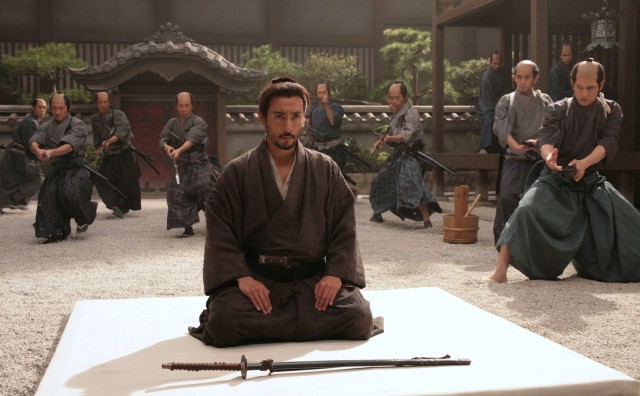
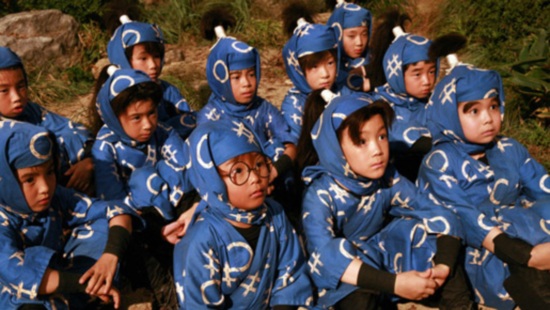
 Japanese director Takashi Miike might be most well known for such wild and crazy violence-filled works as Ichi the Killer, Audition, and the recent 13 Assassins, but among the ninety films he has made during his twenty-year career are a handful of kids movies, from the charming (Zebraman) and the fantastical (The Great Yokai War) to the overwrought (Yatterman) and now, with Ninja Kids!!!, to the relatively mundane. Based on the long-running Japanese children’s program Rantaro the Ninja Boy, which began in 1993 and is now approaching 1,500 episodes, Ninja Kids!!! follows the trials and tribulations of young Rantaro, played by Japanese child star Seishirô Katô (wearing oversized glasses that make him look like a cross between Poindexter and the Warner Bros. bookworm), who is sent off by his farmer parents to ninja school. There he encounters fellow students dripping snot and baby-sitting, a crazy master who continually challenges death, a teacher who is more like a drill sergeant, a big-headed villain who keeps falling over, an old woman who can change appearance at will, and other oddities as he trains to become the master ninja his father never was. The film is composed of a series of vignettes, some that work, many that don’t, but they never come together to form a cohesive narrative. The costumes are colorful and the hairstyles brilliant, but just as with Yatterman, the look of the film clearly trumps the story, which is disjointed and way too over the top, even though it’s supposed to be cartoonish. Ninja Kids!!! is having its world premiere July 3 at the Walter Reade Theater, a joint presentation of the New York Asian Film Festival and Japan Cuts: The New York Festival of Contemporary Japanese Cinema.
Japanese director Takashi Miike might be most well known for such wild and crazy violence-filled works as Ichi the Killer, Audition, and the recent 13 Assassins, but among the ninety films he has made during his twenty-year career are a handful of kids movies, from the charming (Zebraman) and the fantastical (The Great Yokai War) to the overwrought (Yatterman) and now, with Ninja Kids!!!, to the relatively mundane. Based on the long-running Japanese children’s program Rantaro the Ninja Boy, which began in 1993 and is now approaching 1,500 episodes, Ninja Kids!!! follows the trials and tribulations of young Rantaro, played by Japanese child star Seishirô Katô (wearing oversized glasses that make him look like a cross between Poindexter and the Warner Bros. bookworm), who is sent off by his farmer parents to ninja school. There he encounters fellow students dripping snot and baby-sitting, a crazy master who continually challenges death, a teacher who is more like a drill sergeant, a big-headed villain who keeps falling over, an old woman who can change appearance at will, and other oddities as he trains to become the master ninja his father never was. The film is composed of a series of vignettes, some that work, many that don’t, but they never come together to form a cohesive narrative. The costumes are colorful and the hairstyles brilliant, but just as with Yatterman, the look of the film clearly trumps the story, which is disjointed and way too over the top, even though it’s supposed to be cartoonish. Ninja Kids!!! is having its world premiere July 3 at the Walter Reade Theater, a joint presentation of the New York Asian Film Festival and Japan Cuts: The New York Festival of Contemporary Japanese Cinema.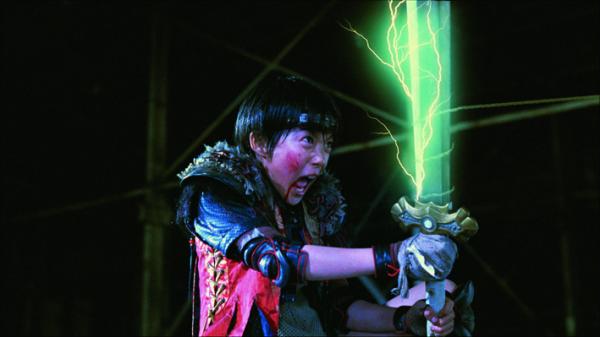
 Mixing in a liberal amount of Time Bandits with The Wizard of Oz, throwing in a little Hayao Miyazaki, and adding dashes of Raiders of the Lost Ark, The Lord of the Rings, Gremlins, Return of the Jedi, Labyrinth, and even Kill Bill, Takashi Miike has wound up with an entertaining fantasy film for both kids and adults. Known more for such ultraviolent, hard-to-watch frightfests as Audition and Ichi the Killer, Miike reveals his softer side in this genre film based on yokai manga by Shigeru Mizuki (who also plays the Demon King). Ryunosuke Kamiki is splendid as Tadashi, a young city boy taking care of his grandfather (Hiroyuki Miyasako) in a country village, where he is chosen at a local festival as the mythical Kirin Rider, the guardian of peace and friend of justice. Soon he finds himself in a real battle between good and evil, taking him from the heights of the Great Goblin’s mountain cave to the depths of a seedy underworld run by the very white Agi (Chiaki Kuriyama) and powerful mastermind Katou Yasunori (Etsushi Toyokawa). Joined by yokai spirits Kawahime (Mai Takahashi), Kawatarou (Sadao Abe), and the oh-so-cute Sunekosuri (we’d buy one of these in a second if they ever hit the market), Tadashi fights to save the human world, wielding his special sword against a phalanx of mechanical robots and other villainous creatures. At more than two hours, The Great Yokai War is at least twenty minutes too long and would have greatly benefited by the excision of one very silly subplot. But it is still a charming tale from the reigning master of horror. The Great Yokai War is screening for only $5 as part of the Film Society of Lincoln Center series “Shinjuku Outlaw: 13 from Takashi Miike,” being held March 16-20 in conjunction with Subway Cinema and also including such Miike films as Fudoh: The New Generation (1996), The Bird People in China (1998), Shangri-la (2002), and the awesome new 13 Assassins (2010). Miike was originally scheduled to appear at the Walter Reade Theater to introduce several screenings but has had to cancel because of the catastrophic events occurring in Japan.
Mixing in a liberal amount of Time Bandits with The Wizard of Oz, throwing in a little Hayao Miyazaki, and adding dashes of Raiders of the Lost Ark, The Lord of the Rings, Gremlins, Return of the Jedi, Labyrinth, and even Kill Bill, Takashi Miike has wound up with an entertaining fantasy film for both kids and adults. Known more for such ultraviolent, hard-to-watch frightfests as Audition and Ichi the Killer, Miike reveals his softer side in this genre film based on yokai manga by Shigeru Mizuki (who also plays the Demon King). Ryunosuke Kamiki is splendid as Tadashi, a young city boy taking care of his grandfather (Hiroyuki Miyasako) in a country village, where he is chosen at a local festival as the mythical Kirin Rider, the guardian of peace and friend of justice. Soon he finds himself in a real battle between good and evil, taking him from the heights of the Great Goblin’s mountain cave to the depths of a seedy underworld run by the very white Agi (Chiaki Kuriyama) and powerful mastermind Katou Yasunori (Etsushi Toyokawa). Joined by yokai spirits Kawahime (Mai Takahashi), Kawatarou (Sadao Abe), and the oh-so-cute Sunekosuri (we’d buy one of these in a second if they ever hit the market), Tadashi fights to save the human world, wielding his special sword against a phalanx of mechanical robots and other villainous creatures. At more than two hours, The Great Yokai War is at least twenty minutes too long and would have greatly benefited by the excision of one very silly subplot. But it is still a charming tale from the reigning master of horror. The Great Yokai War is screening for only $5 as part of the Film Society of Lincoln Center series “Shinjuku Outlaw: 13 from Takashi Miike,” being held March 16-20 in conjunction with Subway Cinema and also including such Miike films as Fudoh: The New Generation (1996), The Bird People in China (1998), Shangri-la (2002), and the awesome new 13 Assassins (2010). Miike was originally scheduled to appear at the Walter Reade Theater to introduce several screenings but has had to cancel because of the catastrophic events occurring in Japan.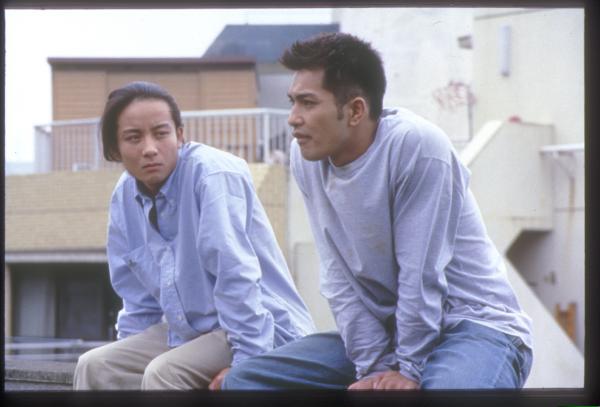
 Takashi Miike complete his thematic Black Society Trilogy with one of his best crime dramas, 1999’s Ley Lines. Following 1995’s Shinjuku Triad Society: Chinese Mafia War and 1997’s Rainy Dog, the third film focuses on Godardian-like ennui of disenchanted youth as Ryuchi (Kazuki Kitamura), his younger brother, Shun (Michisuke Kashiwaya), and their friend Tan (Tomorowo Taguchi), Japanese children of Chinese immigrants, leave their rural home to find a more exciting life in Shinjuku, and they get their wish pretty quickly, immediately getting hustled by tough-talking prostitute Anita (Dan Li). To make money, they start selling toluene on the street and end up on mob boss Wong’s (Naoto Takanaka) bad side, which is never a good idea. Ley Lines is beautifully shot by Naosuke Imaizumi, with intense colors and dramatic shots of the city. Although the film contains plenty of sex and violence, it is also one of Miike’s deepest, most emotional works, especially when the main characters gather on a rooftop and talk about life. Ley Lines, which also features Miike regulars Ren Osugi and Shô Aikawa, is screening twice at the Film Society of Lincoln Center series “Shinjuku Outlaw: 13 from Takashi Miike,” being held March 16-20 in conjunction with Subway Cinema and also including such Miike films as Fudoh: The New Generation (1996), Agitator (2001), Crows Zero II (2009), and the awesome new 13 Assassins (2010). [Ed. note: Miike was originally scheduled to appear at the Walter Reade Theater to introduce several screenings but has had to cancel because of the catastrophic events occurring in Japan.]
Takashi Miike complete his thematic Black Society Trilogy with one of his best crime dramas, 1999’s Ley Lines. Following 1995’s Shinjuku Triad Society: Chinese Mafia War and 1997’s Rainy Dog, the third film focuses on Godardian-like ennui of disenchanted youth as Ryuchi (Kazuki Kitamura), his younger brother, Shun (Michisuke Kashiwaya), and their friend Tan (Tomorowo Taguchi), Japanese children of Chinese immigrants, leave their rural home to find a more exciting life in Shinjuku, and they get their wish pretty quickly, immediately getting hustled by tough-talking prostitute Anita (Dan Li). To make money, they start selling toluene on the street and end up on mob boss Wong’s (Naoto Takanaka) bad side, which is never a good idea. Ley Lines is beautifully shot by Naosuke Imaizumi, with intense colors and dramatic shots of the city. Although the film contains plenty of sex and violence, it is also one of Miike’s deepest, most emotional works, especially when the main characters gather on a rooftop and talk about life. Ley Lines, which also features Miike regulars Ren Osugi and Shô Aikawa, is screening twice at the Film Society of Lincoln Center series “Shinjuku Outlaw: 13 from Takashi Miike,” being held March 16-20 in conjunction with Subway Cinema and also including such Miike films as Fudoh: The New Generation (1996), Agitator (2001), Crows Zero II (2009), and the awesome new 13 Assassins (2010). [Ed. note: Miike was originally scheduled to appear at the Walter Reade Theater to introduce several screenings but has had to cancel because of the catastrophic events occurring in Japan.]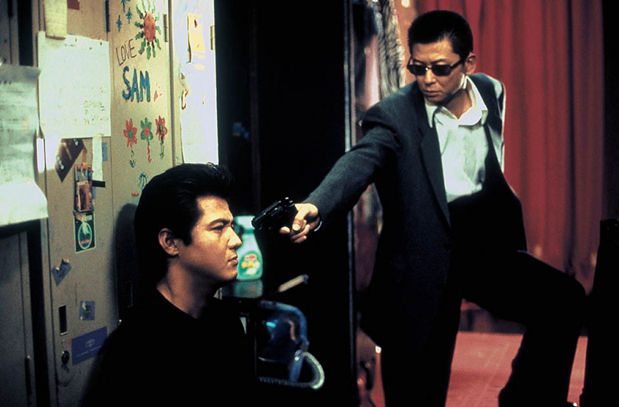
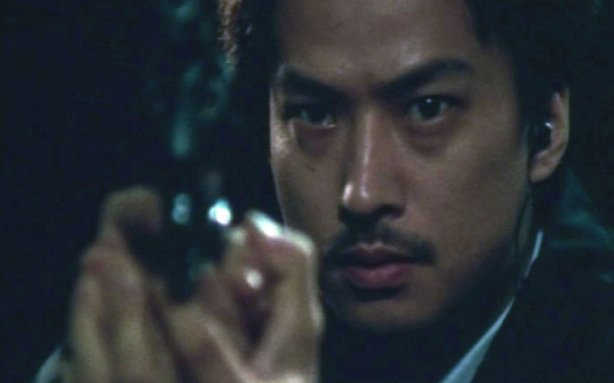
 “Shinjuku is not the best post,” detective Tatsuhito Kiriya says in Shinjuku Triad Society: Chinese Mafia War. Boy, is he not kidding. Takashi Miike’s first major theatrical release after a series of television and straight-to-video projects, 1995’s Shinjuku Triad Society serves as an excellent introduction to the controversial auteur, who is prone to a bit of the old ultra-violence in his films. The fifty-year-old Miike grew up in various parts of Japan but with direct ties to Korean and China, influencing the race battles that drive the Black Society Trilogy, which begins with Shinjuku Triad Society and continues with 1997’s Rainy Dog and 1999’s Ley Lines. In Shinjuku Triad Society, Kippei Shiina stars as Tatsuhito, a cop-on-the-edge desperate to bring down Taiwanese gang leader Wang’s (Tomorowo Taguchi) Dragon’s Claw crime syndicate, turning personal when Tatsuhito’s brother, Yoshihito (Kyosuke Izutsu), starts working for the brutal warlord. The dark, lurid film showcases Miike’s penchant for the extreme, including a ripped-out eyeball, organ selling, slashed bodies, rape, and beheadings. Miike also flips the genre on its head by featuring a lot of gay sex, as Wang has a decided preference for pretty boys. Shinjuku Triad Society, which also features Ren Osugi as Yakuza boss Uchida and Airie Yanagi as sly, dangerous prostitute Ritsuko, is screening March 27 at 4:30 as part of the Film Society of Lincoln Center series “Shinjuku Outlaw: 13 from Takashi Miike,” being held in conjunction with the fine folk over at Subway Cinema. [Ed. note: Miike was originally going to be at the Walter Reade Theater to introduce several screenings but has had to cancel because of the catastrophic events occurring in Japan.]
“Shinjuku is not the best post,” detective Tatsuhito Kiriya says in Shinjuku Triad Society: Chinese Mafia War. Boy, is he not kidding. Takashi Miike’s first major theatrical release after a series of television and straight-to-video projects, 1995’s Shinjuku Triad Society serves as an excellent introduction to the controversial auteur, who is prone to a bit of the old ultra-violence in his films. The fifty-year-old Miike grew up in various parts of Japan but with direct ties to Korean and China, influencing the race battles that drive the Black Society Trilogy, which begins with Shinjuku Triad Society and continues with 1997’s Rainy Dog and 1999’s Ley Lines. In Shinjuku Triad Society, Kippei Shiina stars as Tatsuhito, a cop-on-the-edge desperate to bring down Taiwanese gang leader Wang’s (Tomorowo Taguchi) Dragon’s Claw crime syndicate, turning personal when Tatsuhito’s brother, Yoshihito (Kyosuke Izutsu), starts working for the brutal warlord. The dark, lurid film showcases Miike’s penchant for the extreme, including a ripped-out eyeball, organ selling, slashed bodies, rape, and beheadings. Miike also flips the genre on its head by featuring a lot of gay sex, as Wang has a decided preference for pretty boys. Shinjuku Triad Society, which also features Ren Osugi as Yakuza boss Uchida and Airie Yanagi as sly, dangerous prostitute Ritsuko, is screening March 27 at 4:30 as part of the Film Society of Lincoln Center series “Shinjuku Outlaw: 13 from Takashi Miike,” being held in conjunction with the fine folk over at Subway Cinema. [Ed. note: Miike was originally going to be at the Walter Reade Theater to introduce several screenings but has had to cancel because of the catastrophic events occurring in Japan.]